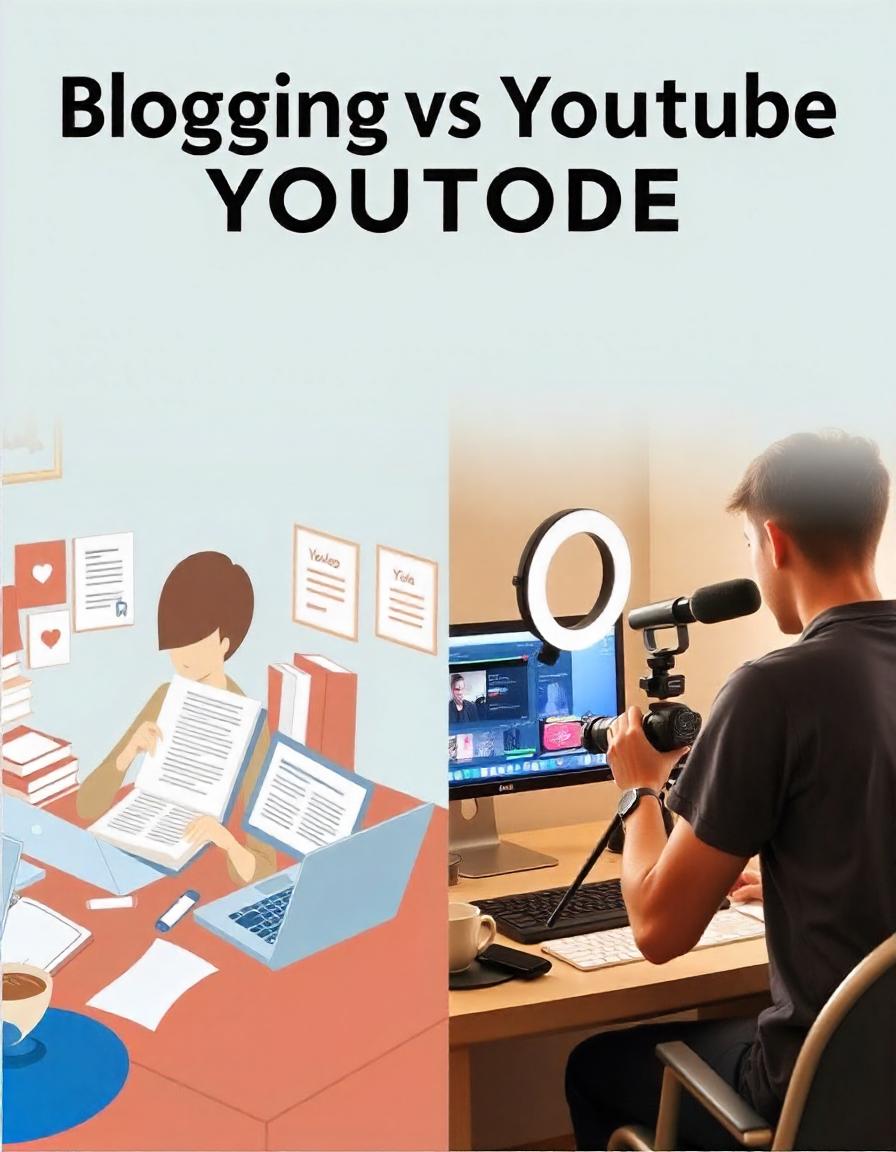Blogging vs. YouTube Income: Which Platform Is More Lucrative?
In the digital age, content creators have a variety of platforms to choose from when it comes to building an audience and earning income. Two of the most popular platforms are blogging and YouTube. Both have proven to be highly effective ways to generate revenue, but they require different strategies, time investments, and skills. So, which one is better when it comes to earning potential? In this article, we’ll compare blogging vs. YouTube income, looking at the different ways you can earn money, the potential for growth, and the unique advantages each platform offers.
How to Earn Money Online – The Ultimate Guide to Financial Freedom!
1. Monetization Methods
Blogging:
Blogging offers several ways to monetize your content once you’ve built an audience. Some of the most common methods include:
- Affiliate Marketing: Bloggers can earn commissions by promoting third-party products or services through affiliate links. When someone clicks on a link and makes a purchase, the blogger earns a percentage of the sale.
- Ad Revenue: Once your blog attracts enough traffic, you can use ad networks like Google AdSense to display ads on your site. You earn money based on clicks (CPC) or impressions (CPM).
- Sponsored Posts: Brands may pay you to write articles about their products or services. This can be a highly lucrative way to generate income, especially as your audience grows.
- Selling Products/Services: Bloggers often sell their own products, such as eBooks, courses, or consulting services, directly to their readers.
- Memberships and Donations: Some bloggers offer premium content through memberships or accept donations via platforms like Patreon.
Find Out How To Make Money As A Full-Time Writer/Blogger Guide
YouTube:
YouTube provides several monetization options, but it also has specific requirements for creators to begin earning revenue. The main ways to earn money on YouTube include:
- Ad Revenue (YouTube Partner Program): YouTube creators can monetize their videos by enabling ads through the YouTube Partner Program. Creators earn money based on ad views, and the earnings are shared with YouTube.
- Channel Memberships: Once you have enough subscribers, YouTube allows you to offer channel memberships, where viewers can pay a monthly fee for exclusive perks like badges, emojis, and member-only content.
- Super Chats and Super Stickers: You can earn money during live streams through Super Chats and Super Stickers, where viewers pay to have their messages or stickers highlighted.
- Sponsored Content: Like bloggers, YouTubers can collaborate with brands for sponsored content. YouTubers often promote products or services directly in their videos, earning money from the brand.
- Merchandise Shelf: YouTube also allows creators to sell branded merchandise directly from their channel. This includes T-shirts, hats, mugs, and more, which can be integrated into your YouTube videos.
How to Earn Money Online – The Ultimate Guide to Financial Freedom!
2. Income Potential and Growth
Blogging:
- Traffic-Dependent: The income you generate from a blog is largely dependent on traffic. The more visitors you have, the more you can earn from ads, affiliate links, and sponsored content. However, building traffic can take time as your blog needs to rank on search engines (SEO) or gain followers through social media.
- Passive Income: Once a blog post ranks in search engines, it can continue generating traffic and income for months or even years. This means bloggers can earn passive income from older content.
- Scaling Takes Time: Scaling a blog’s income requires consistent content creation, SEO optimization, and building relationships with brands. It can take months or even years before your blog becomes a substantial income source.
YouTube:
- Ad Revenue and Views: The income potential on YouTube is directly related to the number of views your videos get. YouTube pays creators based on ad impressions and clicks, but this can be unpredictable depending on the niche and audience engagement.
- More Immediate Earnings: If a video goes viral or gets substantial views quickly, YouTube creators can start earning revenue almost immediately. YouTube’s algorithm favors engaging content, which can result in faster growth compared to blogging.
- Easier to Scale: YouTube channels have the potential to grow more quickly than blogs, especially if the content resonates with a broad audience. With viral videos, creators can see a rapid increase in subscribers and income.
How to Earn Money Online – The Ultimate Guide to Financial Freedom!
3. Audience Engagement and Building a Community
Blogging:
- Written Engagement: Bloggers build a relationship with their audience primarily through written content. Readers engage by leaving comments, sharing posts, or signing up for newsletters. However, the engagement is often less immediate compared to YouTube, where content is more interactive.
- Longer Commitment to Build an Audience: Growing a blog audience takes time, especially when it comes to SEO. You need to consistently create high-quality, search-optimized content to attract new readers and keep them coming back.
YouTube:
- Video Engagement: YouTube allows for a more personal and dynamic interaction with your audience through video. Viewers can comment, like, share, and interact with you directly during live streams. This can create a sense of community, with creators building a loyal following faster than bloggers.
- Immediate Feedback and Interaction: With YouTube, you can get instant feedback from your audience through comments, likes, and live interactions. This fosters a stronger community connection, making it easier to retain subscribers and increase engagement.
How to Earn Money Online – The Ultimate Guide to Financial Freedom!
4. Time and Effort Required
Blogging:
- Content Creation: Writing blog posts takes time, especially if you’re aiming for long-form, SEO-optimized content. On average, it can take a few hours to write a post, including research, writing, and editing.
- Website Management: Bloggers also need to manage their website, including technical aspects like hosting, plugins, design, and SEO optimization. This can require additional time and effort, particularly if you’re running your blog on your own.
YouTube:
- Video Production: YouTube requires a significant investment in video production. This includes scripting, filming, editing, and optimizing the video. Editing can be time-consuming, especially if you want high-quality content.
- Consistency: Like blogging, YouTube creators must consistently upload content to keep their channel growing. This can take a lot of time if you’re producing high-quality videos regularly.
5. Which Platform Is Better for Earning Money?
Both blogging and YouTube offer substantial earning potential, but the platform that works best depends on your strengths and goals:
- Blogging is ideal for those who enjoy writing and are willing to put in the time for SEO and content creation. It is great for building a long-term, passive income stream, especially if you’re able to rank high on search engines and have strong affiliate partnerships or sponsored content.
- YouTube offers faster income opportunities, particularly through ad revenue and viral videos. It’s best for creators who are comfortable in front of the camera and can produce high-quality video content consistently. YouTube is also a fantastic platform for building a community and gaining immediate engagement from your audience.
How to Earn Money Online – The Ultimate Guide to Financial Freedom!
When it comes to earning money, YouTube tends to offer more immediate rewards due to the potential for viral videos and fast-growing channels. Blogging, on the other hand, requires a longer time investment to build organic traffic but can offer a sustainable income through passive revenue streams and affiliate marketing. Both platforms are lucrative, and many creators successfully use both to maximize their income potential. The best choice depends on your content preferences, skill set, and how much time you’re willing to invest in growing your online presence.







